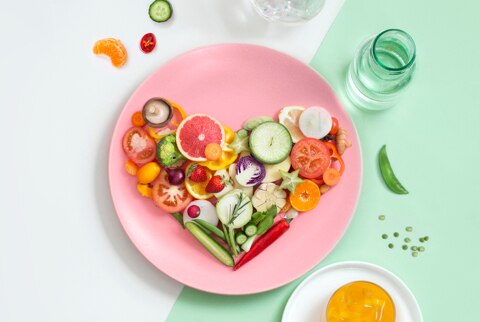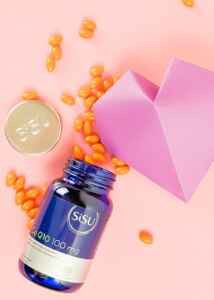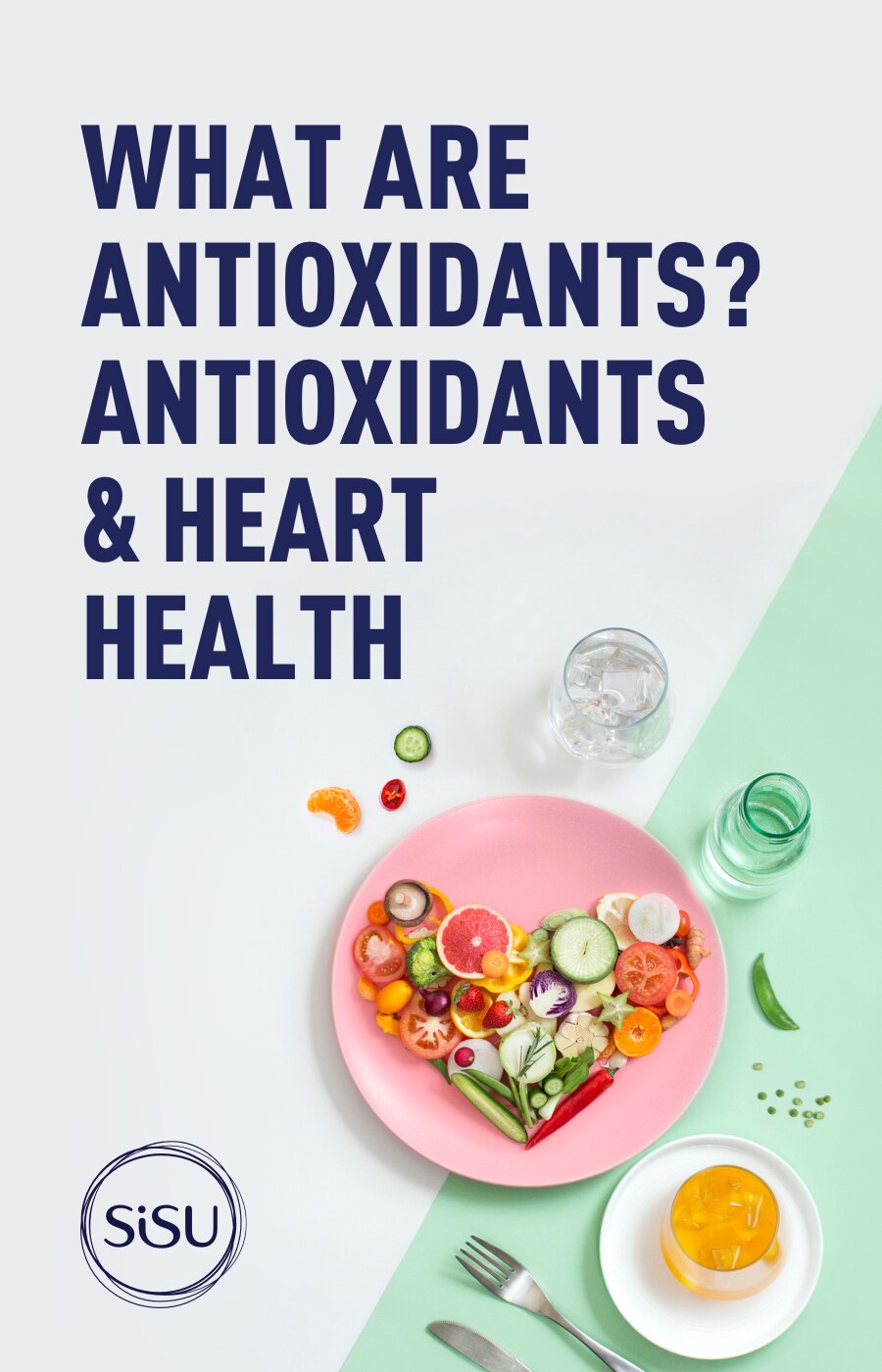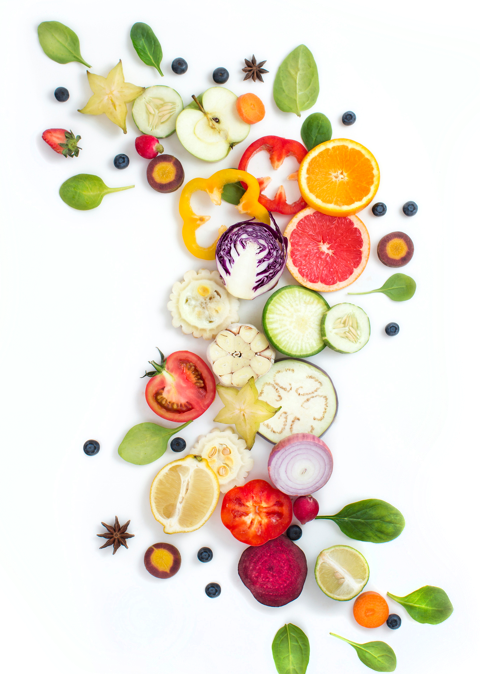
What are antioxidants?
If you’ve been told to eat the rainbow at any point in your life, you can thank antioxidants for that. Antioxidants are natural plant compounds found in fruits and vegetables responsible for giving them their bright colours.

Plants don’t have immune systems. Instead, they use antioxidant defence systems to help protect them from environmental stress1. When we eat fruits and vegetables rich in antioxidants, our bodies use them to reduce cell damage, keep cells healthy, and balance unstable free radicals2.
Free radicals are formed when oxygen molecules split into single atoms with unpaired electrons. Because electrons prefer to be in pairs, these unpaired electrons (free radicals) scavenge the body for other electrons to partner up with. These unpaired electrons are unstable.
Antioxidants can swoop in and defuse the free radicals by lending them an electron, without making themselves unstable in the process. This balances the free radicals.3
When there are more free radicals than antioxidants can keep up with, the free radicals can cause damage to the body.4 5 Over time, having lots of free radicals in the body can contribute to health risks and lead to chronic disease.6
Hence, the frequent advice to eat foods rich in antioxidants.
 Antioxidants and heart health
Antioxidants and heart health
Eating a diet full of antioxidant-rich foods is linked to a lower risk of heart disease.7 Certain antioxidants, like Coenzyme Q10 (CoQ10) in particular, help support heart health.
Coenzyme Q10 (CoQ10) is a fat-soluble antioxidant that helps support cardiovascular health. One study conducted on patients with heart failure found those who were given a CoQ10 supplement had improved cardiac output rates (their hearts could pump more blood per minute) compared to patients who were given placebos.8
Researchers combined data from many studies similar to this one (also known as a meta-analysis) and concluded that CoQ10 can help patients with heart failure by significantly reducing what’s known as major adverse cardiovascular events (death, stroke, or hospitalization due to heart failure).9
In one study, those with higher concentrations of antioxidants (vitamin C and carotenoids) in their blood were shown to have a lower risk of developing a cardiovascular disease.10
The different types of antioxidants
There are hundreds of compounds that act as antioxidants. The most well-known antioxidants, vitamin C, vitamin E, carotenoids, selenium, and zinc, are found in many foods, most of which are fruits and vegetables.
While these nutrients have their own unique functions in the body, they all have one thing in common; they help balance unstable, harmful free radicals.11
Foods that contain antioxidants
Eating foods rich in antioxidants can help increase the level of antioxidants in the bloodstream and reduce the risk of chronic disease.12
Foods that contain antioxidants include:13
| Antioxidant | Benefits | Food sources |
| Vitamin C | Vitamin C plays an important role in helping the immune system. The body needs Vitamin C to synthesize collagen. This dietary antioxidant has also been shown to help reduce free radicals and lipid oxidation in the body’s tissues.14 | Broccoli, Brussels sprouts, cantaloupe, cauliflower, grapefruit, leafy greens (turnip, mustard, beet, collards), honeydew, kale, kiwi, lemon, orange, papaya, snow peas, strawberries, sweet potato, tomatoes, and bell peppers. |
| Vitamin E | Vitamin E is an antioxidant known for the maintenance of good health. This antioxidant helps protect cells against the oxidative damage caused by free radicals. | Almonds, avocado, Swiss chard, leafy greens (beet, mustard, turnip), peanuts, red peppers, spinach (boiled), and sunflower seeds. |
| Carotenoids (beta-carotene and lycopene) | Lutein is an antioxidant in the carotenoid family that helps maintain eye health. It also helps support eye health in conditions such as cataracts and age-related macular degeneration. | Apricots, asparagus, beets, broccoli, cantaloupe, carrots, bell peppers, kale, mangos, turnip, collard greens, oranges, peaches, pink grapefruit, pumpkin, winter squash, spinach, sweet potato, tangerines, tomatoes, and watermelon. |
| Selenium | Selenium is an antioxidant that helps protect against oxidative stress. A selenium supplement can help prevent selenium deficiency. | Brazil nuts, fish, shellfish, beef, poultry, barley, and brown rice. |
| Zinc | Zinc helps with immune function and helps to maintain healthy bones, hair, skin, and nails. | Beef, poultry, oysters, shrimp, sesame seeds, pumpkin seeds, chickpeas, lentils, cashews, and fortified cereals. |
| Phenolic compounds | Phenolic compounds can help with anti-ageing and anti-inflammatory defence responses.15 | Apples, red wine, onions, green tea, cocoa, berries, grapes, peanuts, and spices. |
| CoQ10 | Co Q10 helps to support and maintain cardiovascular health. | Cabbage, broccoli, oysters, avocado, and oranges.16 |
Antioxidant supplements
If you can’t get the antioxidants, you need from food alone, consider meeting with a healthcare practitioner to see if an antioxidant supplement is right for you.
“I would recommend this product. It’s the best I’ve tried.”
– Seeta
 How to decrease oxidative stress – can sleep protect you from free radicals?
How to decrease oxidative stress – can sleep protect you from free radicals?
Oxidative stress occurs when free radical activity and antioxidant activity aren’t balanced in the body.17 In other words, ; when there are consistently more unstable free radicals in the body than antioxidants can keep up with.
Oxidative stress may be linked to cardiovascular disease and overtime may cause damage to the cardiovascular system.18 19
Eating the rainbow isn’t the only way to help balance free radical levels in your body. A good night’s sleep can work the same wonders.
Sleep has been theorized to help reduce free radicals in the body.20 Unsurprisingly, lack of sleep has been connected to many diseases which are also linked to oxidative stress. 21 22
Researchers found a relationship between oxidative stress and sleep, among fruit flies.23 While this can’t be proven in humans (yet) experts believe this study supports the idea that oxidative stress can stimulate sleep. This might explain why you feel like crashing on the couch after a stressful day at work!
This suggests that the more oxidative stress your body faces, the more sleep it needs.
Getting enough sleep can help support your body in its effort to fight off free radicals that can cause oxidative stress over time.
Learn more about the latest health and wellness findings by following Sisu on Instagram.
If you have health problems, please seek help from a healthcare practitioner. Always check with a healthcare practitioner before taking a nutritional supplement. These recommendations are for information and education purposes.
1 https://www.intechopen.com/books/phytochemicals-source-of-antioxidants-and-role-in-disease-prevention/free-radicals-and-the-role-of-plant-phytochemicals-as-antioxidants-against-oxidative-stress-related-
2 https://www.hsph.harvard.edu/nutritionsource/antioxidants/#introduction
3 https://www.healthline.com/health/oxidative-stress
4 https://www.livescience.com/54901-free-radicals.html
5 https://www.ncbi.nlm.nih.gov/pmc/articles/PMC3249911/
6 https://www.healthline.com/nutrition/foods-high-in-antioxidants#section1
7 https://www.healthline.com/nutrition/foods-high-in-antioxidants#section1
8 https://openheart.bmj.com/content/2/1/e000326#ref-67
9 https://openheart.bmj.com/content/2/1/e000326
10 https://academic.oup.com/ajcn/article/108/5/1069/5201459
11 https://www.mayoclinic.org/healthy-lifestyle/nutrition-and-healthy-eating/multimedia/antioxidants/sls-20076428
12 https://www.rwjbh.org/blog/2019/august/the-healthy-benefits-of-antioxidants/
13 https://www.hsph.harvard.edu/nutritionsource/antioxidants/#introduction
14 https://ods.od.nih.gov/factsheets/VitaminC-HealthProfessional/
15 https://www.ncbi.nlm.nih.gov/pubmed/27754463
16 https://ubiquinol.org/blog/six-incredible-ways-get-ubiquinol-coq10-food
17 https://www.healthline.com/health/oxidative-stress#effects
18 https://pubmed.ncbi.nlm.nih.gov/10872549-role-of-oxidative-stress-in-cardiovascular-diseases/
19 https://www.ahajournals.org/doi/10.1161/01.ATV.0000150649.39934.13
20 https://www.ncbi.nlm.nih.gov/pubmed/7838006
21 https://www.ncbi.nlm.nih.gov/pubmed/21300732
22 https://www.ncbi.nlm.nih.gov/pubmed/21030723
23 https://www.ncbi.nlm.nih.gov/pmc/articles/PMC6042693


